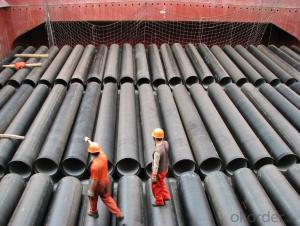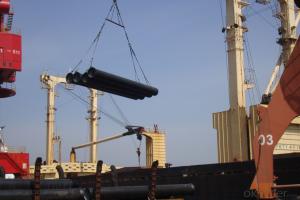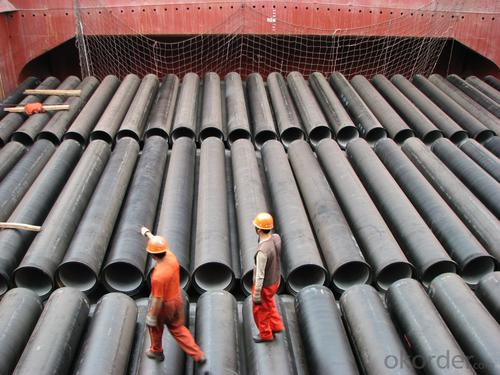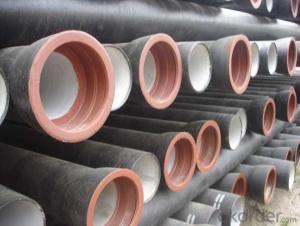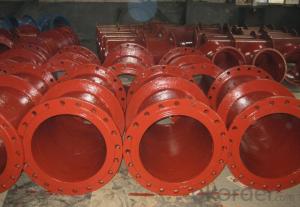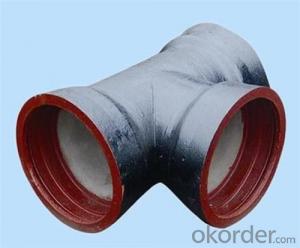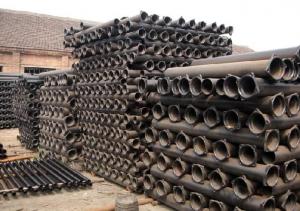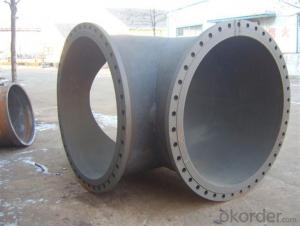Ductile Iron Pipe Manufacturers Cheap Pricing EN545 DN300
- Loading Port:
- China main port
- Payment Terms:
- TT or LC
- Min Order Qty:
- 20 m.t.
- Supply Capability:
- 200000 m.t./month
OKorder Service Pledge
OKorder Financial Service
You Might Also Like
1,Ductile Iron Pipe Description :
DI pipe fittings are manufactured according to ISO 2531 or BS EN545 or BS4772 FOR POTABLE WATER ,internal is cement lining or wet epoxy coating;External is zinc plus bitumen or wet epoxy coating. We also manufacture ductile iron fittings with fusion bonded epoxy both inside and outside. All the producets are sutible to water pipes fields.We have passed ISO9001,ISO14001,OHSMS18001 certificate.We can do third party inspection according to customer's request.
2,Main Features of the Ductile Iron Pipe:
1).Quality guarantee
• Chemical checking
• NDE after rough machining
• Mechanical testing after heat treatment
2).Quality document
• Full Q.A document as per client request
3).Packing and Shipping
• standard export package(carton/wooden case/pallet)
• accept FOB,FAS,CNF,CIF door to door etc or customer designated shipping agent
4).Service
• Drawing: we can translate your original drawing, offer best suggestion on design
• Quality: we have full set quality control system to guarantee the best quality.
3,Ductile Iron Pipe Images:
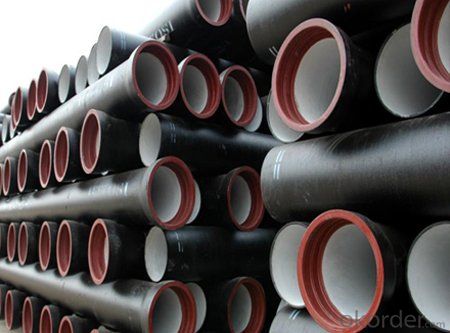
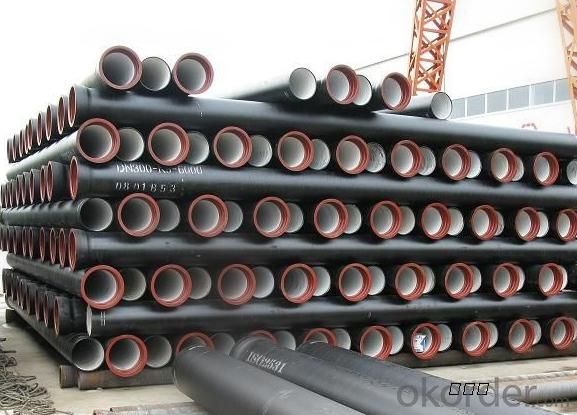
4.Ductile Iron Pipe Specification:
Place of Origin: China (Mainland)
Model Number: DN80-1600
Length: 6M/5.7M/NEGOTIATED
Standard: ISO2531 / EN545
Application: Potable/Sewage Water
Diameter: DN80-1600
Shape: Round
Hardness: 230
Pipe Wall Thickness: standerd
Pull Strength: 420
Yield (≥ MPa): 300
5.FAQ:
We have organized several common questions for our clients,may help you sincerely:
1.Q: Why would you choose ductile iron pipe rather than other pipe materials?
A:The reasons are obvious for that not only ductile iron pipe possesses the inherent strength and flexibility of ductile iron, combined with proven corrosion protection systems, but also the cost savings can be achieved from design to installation and commissioning.
2.Q:Why can you guarantee the inner of pipes can’t be corroded?
A: High alumina cement mortar lining and sulphate-resistant cement mortar lining. These two special linings are applicable to inner anti-corrosion for sewage pipes, improving resistance to erosion of the sewage components.
- Q: What is the expected burst pressure of ductile iron pipes?
- The expected burst pressure of ductile iron pipes can vary depending on various factors such as the pipe diameter, wall thickness, and the specific grade of ductile iron used. However, in general, ductile iron pipes typically have a burst pressure ranging from 350 to 700 psi (pounds per square inch).
- Q: Are ductile iron pipes resistant to impact damage?
- Ductile iron pipes are known for their exceptional strength and durability, making them highly resistant to impact damage. Due to their unique composition, which includes a higher percentage of carbon and silicon, ductile iron pipes possess excellent toughness and flexibility. This allows them to withstand external forces and impacts, such as heavy construction equipment or accidental impacts during installation or maintenance activities. Additionally, ductile iron pipes have a high resistance to cracking and fracturing, further enhancing their ability to withstand impact damage. However, it is important to note that while ductile iron pipes are highly resistant to impact damage, they are not completely immune. Extreme or repeated impacts may still cause damage, albeit to a lesser extent than other types of pipes. Regular inspections and maintenance are crucial to identifying and addressing any potential impact damage to ensure the long-term integrity and performance of ductile iron pipes.
- Q: How does ductile iron pipe perform in seismic areas?
- Ductile iron pipe performs well in seismic areas due to its inherent strength and flexibility. Its ability to withstand ground movement and vibrations makes it a reliable choice for underground infrastructure in regions prone to earthquakes. Additionally, its robust construction and high resistance to corrosion and damage ensure its durability and safety even in seismically active zones.
- Q: Are ductile iron pipes suitable for installation in areas with high soil compaction?
- Yes, ductile iron pipes are suitable for installation in areas with high soil compaction. Ductile iron pipes are known for their strength and durability, making them highly resistant to external loads and pressures. The material's inherent flexibility allows it to withstand the stresses caused by high soil compaction. Additionally, ductile iron pipes have a high modulus of elasticity, which helps them maintain their shape and structural integrity even under heavy loads. Therefore, they are an excellent choice for areas with high soil compaction, as they can effectively handle the pressure and provide reliable and long-lasting performance.
- Q: What are the advantages of using ductile iron pipe over concrete pipe?
- There are several advantages of using ductile iron pipe over concrete pipe. Firstly, ductile iron pipe has superior strength and durability, with a higher resistance to cracking and breaking compared to concrete pipe. This makes it ideal for underground applications where it is subjected to heavy loads and pressure. Secondly, ductile iron pipe has a longer service life, typically lasting 50 to 100 years, compared to the 30 to 50-year lifespan of concrete pipe. Additionally, ductile iron pipe is easier to install and maintain, as it is lighter in weight and requires fewer joints. It also offers better flow capacity, reducing head loss and improving overall system efficiency. Lastly, ductile iron pipe is more resistant to corrosion, ensuring long-term reliability and reduced maintenance costs.
- Q: How can 4 inch ductile iron pipe be connected with 2 inch galvanized pipe?
- The general electric welded steel pipe for clarinet.
- Q: What is the expected joint restraint method for ductile iron pipes?
- The expected joint restraint method for ductile iron pipes is typically mechanical joints or push-on joints. These joints provide a secure and leak-free connection between the pipes, ensuring the stability and integrity of the pipeline system. Mechanical joints involve the use of rubber gaskets and bolts to tightly seal the joint, while push-on joints utilize a groove and rubber gasket system to create a watertight seal. Both methods offer excellent joint restraint capabilities, allowing for the effective transmission of fluids or gases through the pipeline without the risk of joint separation or failure. Additionally, these joint restraint methods also facilitate ease of installation and maintenance, making them a preferred choice for ductile iron pipe systems.
- Q: What is the difference between ductile iron pipes and cast iron pipes?
- Ductile iron pipes and cast iron pipes have different compositions, properties, manufacturing processes, and applications. Ductile iron pipes are made from a type of cast iron known as ductile iron, which contains higher levels of carbon, silicon, and other alloying elements like magnesium. On the other hand, cast iron pipes are made from regular cast iron, which has a higher carbon content and lower levels of alloying elements. In terms of properties, ductile iron pipes are recognized for their high tensile strength, flexibility, and durability. They can withstand higher pressure and have a greater resistance to impact, making them suitable for applications that demand robust performance. Conversely, cast iron pipes are more brittle and fragile, making them susceptible to cracking or breaking under pressure or impact. The manufacturing process differs as well. Ductile iron pipes are formed through centrifugal casting, in which molten ductile iron is poured into a spinning mold. This centrifugal force aids in the even distribution of the molten metal, resulting in a strong and uniform pipe. On the other hand, cast iron pipes are made using sand casting, where molten cast iron is poured into a mold made of compacted sand. This method is less precise and can result in variations in the final product. In terms of applications, ductile iron pipes are commonly used in water and sewage systems, as well as in industrial pipelines that require high-pressure resistance. Cast iron pipes, on the other hand, are typically used in non-pressure applications such as drainage systems or underground sewer lines. To summarize, ductile iron pipes and cast iron pipes differ in their composition, properties, manufacturing processes, and applications. Ductile iron pipes offer greater strength, flexibility, and durability, making them suitable for high-pressure applications, while cast iron pipes are more brittle and commonly used in non-pressure applications.
- Q: Are ductile iron pipes resistant to chemicals or solvents?
- Ductile iron pipes are generally resistant to a wide range of chemicals and solvents. This is due to their composition, which includes a high percentage of iron and carbon, along with small amounts of other alloying elements like silicon, manganese, and magnesium. These alloying elements contribute to the overall strength and durability of ductile iron pipes, making them highly resistant to corrosion and chemical attack. However, it is important to note that the resistance of ductile iron pipes to chemicals and solvents can vary depending on the specific substance and its concentration. Some aggressive chemicals or solvents, particularly those with high acidity or alkalinity, may cause gradual corrosion or degradation of the pipe material over time. In such cases, it is advisable to consult with the pipe manufacturer or a professional engineer to ensure the compatibility of the pipe with the specific chemicals or solvents being used. Additionally, proper installation and maintenance practices play a crucial role in maintaining the chemical resistance of ductile iron pipes. Regular inspection, cleaning, and protective coatings can help to prolong the lifespan and performance of the pipes in the presence of various chemicals or solvents.
- Q: How does ductile iron pipe perform in extreme weather conditions?
- Ductile iron pipes are renowned for their exceptional performance in adverse weather conditions. These pipes demonstrate remarkable durability, resistance, and flexibility, making them suitable for enduring harsh weather such as extreme temperatures, heavy rainfall, snowfall, and even earthquakes. One of the notable characteristics of ductile iron is its capacity to withstand damage caused by freezing temperatures. Unlike other materials, ductile iron pipes possess a low coefficient of thermal expansion, enabling them to resist the expansion and contraction that occurs during freeze-thaw cycles without experiencing cracks or breaks. Consequently, these pipes remain intact and continue to function optimally even in extremely cold conditions. Furthermore, ductile iron pipes exhibit excellent resistance to corrosion, rendering them highly resilient to the corrosive effects of severe weather. They are shielded by a sturdy zinc coating, which acts as a barrier against rust and other forms of corrosion. This coating, in conjunction with the inherent strength of ductile iron, grants these pipes exceptional resistance to the corrosive effects of rain, snow, and moisture. Moreover, ductile iron pipes possess superior flexibility, allowing them to accommodate ground movement and seismic activity. In areas prone to earthquakes or soil shifting, these pipes can absorb stress and strain without fracturing, guaranteeing a continuous supply of water and sewage services even in the most challenging weather conditions. Overall, ductile iron pipes excel in extreme weather conditions due to their durability, resistance to freezing, corrosion, and flexibility. Their ability to withstand the elements ensures an uninterrupted supply of water and sewage systems, providing reliability and peace of mind to utility providers and communities, even in the most unforgiving environments.
Send your message to us
Ductile Iron Pipe Manufacturers Cheap Pricing EN545 DN300
- Loading Port:
- China main port
- Payment Terms:
- TT or LC
- Min Order Qty:
- 20 m.t.
- Supply Capability:
- 200000 m.t./month
OKorder Service Pledge
OKorder Financial Service
Similar products
Hot products
Hot Searches
Related keywords
